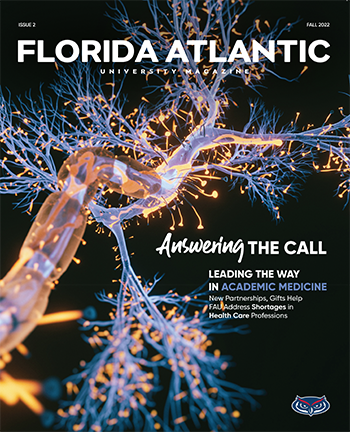
12/22/2022
Expanding Global Collaborations
Vice President for Research Earns Fulbright Scholarship
A research scientist for more than two decades, Daniel C. Flynn, Ph.D., leads all research-related endeavors across Florida Atlantic. Since joining the university as vice president for research in 2015, annual research expenditures have nearly tripled. Flynn also built a robust pipeline for entre-preneurship and economic development, strengthening the university’s corporate partnerships in research.
Now, as a recipient of a prestigious Fulbright Scholarship, Flynn is pursuing research and collaboration with international partners in a program designed to familiarize him with the process of translating research discoveries into economic and societal benefits.
The Fulbright Program is the U.S. government’s preeminent educational and cultural affairs program. It offers renowned students, educators and accomplished professionals support to pursue research and professional projects in partnership with more than 160 countries worldwide.
As a member of the 2022 International Education Award delegation, Flynn is taking part in a two-week group seminar designed to acquaint him and other administrators from the U.S. with France’s higher education and research systems.
“This experience allows me to gain a new perspective in refining the means we utilize in engaging faculty and developing intellectual property and collaborations with international counterparts, thus broadening the research portfolio at FAU,” Flynn said.
Flynn received his doctorate in virology from North Carolina State University and spent more than two decades in various research-related roles in the fields of cancer cell biology and breast cancer invasion before making his transition to research administration in 2008.
“Dan’s investment in collaborative academic achievement and technological growth have resulted in exponential increases in research funding and expenditures for the university,” said FAU President John Kelly. “This scholarship provides an exciting opportunity to further expand innovative research, education and collaboration between Florida Atlantic faculty and scientists worldwide.”
Here is what Flynn said about this opportunity:
Q: What inspired you to pursue the international education Fulbright Scholar Program?
A: I had a very successful career as a research scientist and was able to develop Protea Biosciences, a start-up company that was reasonably successful. It lasted about 16 years and employed nearly 50 people.
I learned a lot about how to bring scientific discoveries to the marketplace to benefit society. This experience motivated me to move into research administration and help guide other faculty on how to develop their research discoveries into applications that can help people.
The Fulbright Scholar Program will allow me to take my experiences and the lessons I’ve learned and share them with an international community and, in turn, learn from them what works well. This exchange of knowledge will allow me to bring back new information and help to enrich our research environment at FAU.
Q: How might your past and current experience in research contribute to the international delegation?
A: In addition to my time with Protea Biosciences, I had the opportunity to be mentored by a CEO while serving as a consultant and chief science officer for a company. Since then, I served on the board of BioArkive, Inc. where I assisted in the preparation of an acquisition by Immuneering, a San Diego-based pharmaceutical company. Currently, I advise three other small biotech start-up companies, including a very exciting one right here in Palm Beach County. All of these biotech companies are different. I am looking forward to sharing lessons learned from the combined experiences with the delegation.
Q: How does your participation in the Fulbright Program expand FAU’s global reach?
A: The FAU Division of Research facilitates international research collaborations with Israel, Colombia and Ecuador — and soon, Chile and Bolivia. It is our hope that we can attract technology-based companies from these countries to have landing sites in Palm Beach County and to learn how to collaborate. It is our goal to have regional technology-based companies with headquarters in any of these countries.
Q: Reflect on a pivotal moment in your life that helped put you on your current trajectory.
A: In 2001, the director of the West Virginia University (WVU) Cancer Center took a chance on me and promoted me to associate director for cancer research. I was only 42 years old — relatively young for a position of that stature. While in this position, I applied for and obtained a $22 million grant that supported research at WVU and funded the development of technology service centers to help faculty with research. Also, at the time, a technology was coming along called proteomics, which is the large-scale analysis of proteins. It inspired the development of a proteomics service center for WVU faculty. From there, I realized that proteomics would soon cause new companies to emerge and operate independently, so I decided to start Protea Biosciences. That experience fostered my interest in university technology transfer and how to take research from the laboratory to the marketplace.
If you would like more information, please contact us at dorcommunications@fau.edu.
